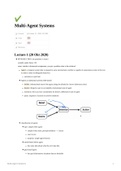✔
Multi-Agent Systems
Created @October 21, 2020 3:03 PM
Class S2
Type S2
Materials
Lecture 1 (20 Okt 2020)
INTRODUCTION, no questions in exam!
youtube: game theory 101
exam: similar to homework assignment, you get a problem what is the solution?
Agent: a computer system that is situated in some environment, and that is capable of autonomous action in this env.
in order to meet its delegated objectives.
autonomy is spectrum
Agents as intentional systems: BDI model
beliefs: informational state of the agent, things he (thinks) he knows (inference rules)
desires: things he want to accomplish, motivational state of agent
intentions: here you have commitment for desires, deliberative state of agent
plans: sequence of actions to achieve intentions
classification of agents
type: simple reflex agent
simple if then rules; percept/condition —> action
react to env
property: simple ignore history
model-based reflex agent:
has some idea about what the env looks like
goal-based agent
has goal information: situations that are desirable
Multi-Agent Systems 1
, search and planning in action space; action sequences that achieve the agent's goals
Utility-based agent:
goal-based only distinguish between goal states and non-goals
search paths and avoid long paths, tells about how happy agent is regarding found solutions
learning agents
we got different elements
sensors, how well are we doing? —> feedback to learning element and choose best thing to do.
different feedback loops that allow to have different performance
this type we encounter in second part of course
intelligent agents
a computer system capable of flexible autonomous action in some env
flexible:
multi-agent systems
such a system is one that consists of a number of agents that (interact with each other and env). In general those
agents have different goals. To successfully interact, they will have to learn, cooperate, coordinate, and negotiate
MAS vs Agent-based modelling (ABM)
agent-based modelling of complex systems:
complex systems: many, non-linear interactions (ecology, social science, etc)
third way in science: theory, experiments, simulations
the difference is in detail, agent-based is detailed (?)
Multi-Agent Systems 2
, motivation for studying MAS:
technological:
growth of distributed, networked computer systems (computers act more as individuals than parts)
robustness: no single point of failure
scalable and flexible: adding new agents when needed, asynchronous, parallel processing
development and reusability: components developed individually by their own specialists.
scientific: provides models for interactivity in (human) societies. models for emergence of coordination.
cooperation: coordination among non-antagonistic agents
negotiation: coordination among self-interested agents
typical questions:
how can cooperation emerge in societies of self-interested agents?
what actions should agents take to optimize their rewards/utility
how can self-interested agents learn from interaction with the env. and other agents to further their
goals?
how can autonomous agents coordinate their activities so as to cooperatively achieve goals?
interdisciplinary
influenced and inspired by many other fields
this can be strength and a weakness
this has analogies (overeenkomsten) with AI itself
MAS as distributed AI (DAI)
How and when should which agents interact in order to achieve their design objectives?
Approaches:
bottom up: given specific capabilities of individual agents, what collective behaviour will emerge?
top-down: search for specific group-level rules that successfully constrain or guide behaviors at
individual level
distributed AI:
AI cognitive processes in individuals
DAI: social processes in groups
environments:
accessible vs inaccessible
accessible: one in which the agent can obtain complete, accurate, up-to-date info about the env state
inaccessible:
Mostmoderatelycomplexenvironments(including,forexample,theeverydayphysicalworldandtheInternet),
the more accessible an env is, the simpler it is to build agents to operate in it
deterministic vs nondeterministic
deterministic: any action has a single guaranteed effect - there is no uncertainty about the state that will
result performing an action
nondeterministic: greater problems for the agent designer, physical world
Multi-Agent Systems 3
, static vs dynamic
static: env does not change except by the performance of actions by the agent
dynamic: has other processes operating on it, and which hence changes in ways beyond the agents
control
other processes can interfere with the agents actions (as in concurrent systems theory)
discrete vs continuous:
discrete env: fixed, finite number of actions and percepts in it, can be handles with lookup table
continuous: certain level of mismatch with computer systems
Game Theory, intro and basic concepts
important as models
many interactions in society or nature share the same ingredients
ingredients of interesting games
players
rules determine which actions can be taken, and what the corresponding pay-offs are;
maximize your pay-off, everyone wants to win
competition and collaboration: individuals or teams
science of strategic thinking
started as tool in economics
it provides a level of abstraction appropriate to study a wide range
cooperative vs non-cooperative games:
non-cooperative: selfish individuals, only considering their own interest. Do not coordinate their actions in
groups. agreements need to be self-enforcing
cooperative : groups of players coordinate their actions
non-transferable utility: pay-off each individual increases, transfer is not possible
transferable utility: need to find a fair way to divide the additional value generated by collaboration
mechanism design: how to set up rules of game so that selfish individual behavior will lead to social welfare
Lecture 2 (22 Okt) + Lecture 3 (3 Nov)
Game theory cont.
Strategic games: Basic Concepts
Game theory studies multiagent decision problems, that is, problems in which independent decision-makers interact.
In these games, act of each agent has an effect on the other agents in the group;
Assumptions, agents have:
preferences encoded in utility function (pay-off)
self-interest: strive to maximize their own pay-off
rational behaviour: reasoning about the actions of other agents
Multi-Agent Systems 4





